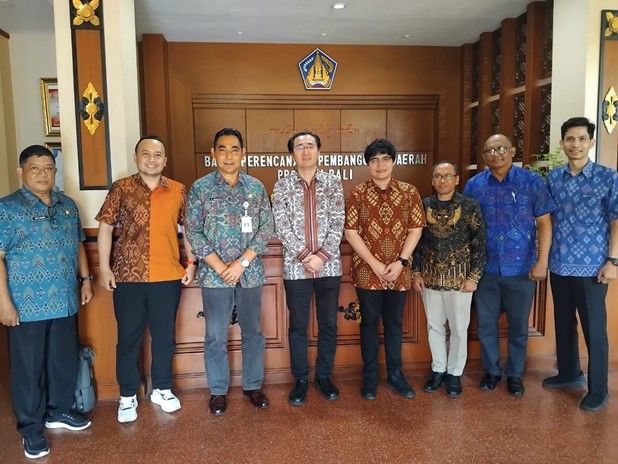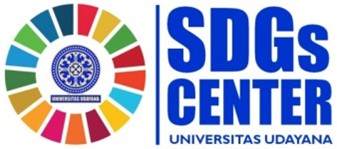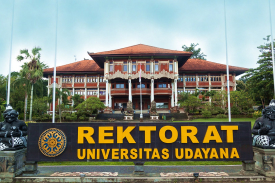Collaboration between JICA SDGs Project, SDGs Center Unud and Bappeda Bali Province Agreed to Strengthen the Framework for SDGs Implementation in Bali
Located in
Sandat Room, Bali Province Bappeda, on July 23, 2024, from 13.00 to 14.30 Wita,
a meeting on Strengthening the SDGs Implementation Framework for Local
Government was held.
Prof. Dr. Ir. I Wayan Budiasa, S.P., M.P., IPU, ASEAN Eng, as Chairman of SDGs
Center Unud, introduced Hisaaki Mitsui as JICA SDGs Project Team Leader,
accompanied by Michael Permana Rinaldi (Senior Researcher of JICA SDGs Project)
and Dr. I Ketut Surya Diarta, S.P., M.A. (Secretary of SDGs Center Unud). The
visit was welcomed very well by Ida Bagus Gde Wesnawa Punia, S.T., M.Si., as
the Head of Governance and Human Development, and a number of staff. Prof.
Budiasa confirmed that this meeting was a follow-up meeting from the previous
meeting between the JICA SDGs Project (represented by Michael Permana Rinaldi,
accompanied by the Head of SDGs Center Unud), the Head of PPM, and staff
representing Bappeda of Bali Province, which was held on July 15, 2024, at the
Postgraduate Building of Udayana University.

Hisaaki
Mitsui explained that this meeting was an implementation of cooperation between
the Government of Indonesia through the Ministry of National Development
Planning/Bappenas and the Japan International Cooperation Agency (JICA) in the
context of implementing Presidential Regulation 59 of 2017 which was renewed by
Presidential Regulation 111 of 2022 on the Implementation of Achieving
Sustainable Development Goals (SDGs) in Indonesia. The period of the JICA SDGs
Project starts from December 2023 to November 2026. Currently, the JICA SDGs
Project is entering phase II with the aim to strengthen the implementation
capacity of SDGs of local governments in five selected provinces as Pilot
Projects, namely North Sumatra Province, DKI Jakarta Province, East Kalimantan
Province, Bali Province, and South Sulawesi Province. The expected outputs of
this project are (1) the existence of SDG/SDGs implementation mechanism in the
selected provinces directly supported by SDGs Center, (2) the capacity building
of monitoring and evaluation (e-MONEV) of SDG/SDGs Local Action Plan (RAD) for
the selected provincial governments, and (3) the promotion of multi-stakeholder
cooperation with non-governmental actors in the selected provinces in
supporting the implementation and achievement of SDG/SDGs.
A good
practice related to output 3 was shared by Hisaaki Mitsui, namely the SDGs
Business Registration Program. A system for more than 100 local governments in
Japan that nationally registers about 53,000 local businesses (most
participants are MSMEs) that demonstrate a desire to achieve the SDGs. The
program does not intend to reward companies for their achievements, but rather
to register companies that are motivated to achieve SDGs in the future. All
companies that meet certain requirements will be registered, and the
requirements are not the same for each local government. Examples of SDGs
company registration requirements in Nagano Prefectural government: (1) State
management policies, etc. for achieving SDGs as well as priorities and targets
for the three aspects of environment, social, and economy; (2) Describe 42
assessment points set by the local government as specific initiatives with
respect to company activities related to SDGs, e.g. absence of sexual
violence/harassment, occupational safety and health (OSH), etc.
(self-assessment). The benefits for companies that have registered with the
SDGs logo are easy promotion on local government websites, low-interest loan
facilities, extra points when submitting tenders, and an improved company
image, especially in labor recruitment, received
facilities in business partner meetings. Mitsui added, Bali Province with
tourism as the leading sector has the potential to adopt good practices in
Japan.
Ida Bagus
Wesnawa Punia, S.T., M.Si. responded positively to Mitsui's presentation. To
achieve output 1, it is very important that JICA SDGs Project facilitates the
human resources of District/City Bappeda to have equal and adequate
understanding related to the implementation of SDGs in District/City throughout
Bali. Previously, we have encouraged the establishment of SDGs Center Unud, and
have received training from JICA SDGs Project. We hope that SDGs Center Unud
together with JICA SDGs Project can facilitate the gathering of human resources
of Bappeda Kabupaten/Kota throughout Bali to get training in advance so that
they are ready and not confused in implementing SDGs. Related to output 2, we
have compiled the RAD and we compiled the annual report that is mandated. The
biggest problem we face is in collecting or fulfilling the data. Therefore,
capacity building on monitoring and evaluation (e-MONEV) of SDGs Local Action
Plan (RAD) for local governments is also very relevant. With the realization of
outputs 1 and 2, it is easier to copy good practices in Japan to be applied in
Bali Province as the implementation of output 3. Moreover, in Bali Province,
the Social and Environmental Responsibility Forum (TJSL Forum) has been
established based on the Bali Provincial Regulation No. 8 of 2023 on Corporate
Social Responsibility, and Bali Governor Regulation No. 46 of 2023 on the
Implementation Regulation of the regulation. This is expected to
strengthen the implementation of output 3 of the JICA SDGs Project.
Dr. Surya
Diarta added that related to the sustainable tourism sector, Bali needs to lead
to quality tourism as mentioned by Mitsui-sensei and Pak Bagus Wesnawa because
Bali has a certain carrying capacity. Community Based Quality Tourism (CBQT) is
in line with the SDGs through standardization that refers to Permenparekraf
Number 9 of 2021 concerning Guidelines for Sustainable Tourism Destinations and
international criteria from GSTC 2019 which have indeed integrated the SDGs
into these standards / criteria. We can start CBQT from the village as a
stronghold to save Bali from the onslaught of the tourism industry and mass
tourism.


UDAYANA UNIVERSITY